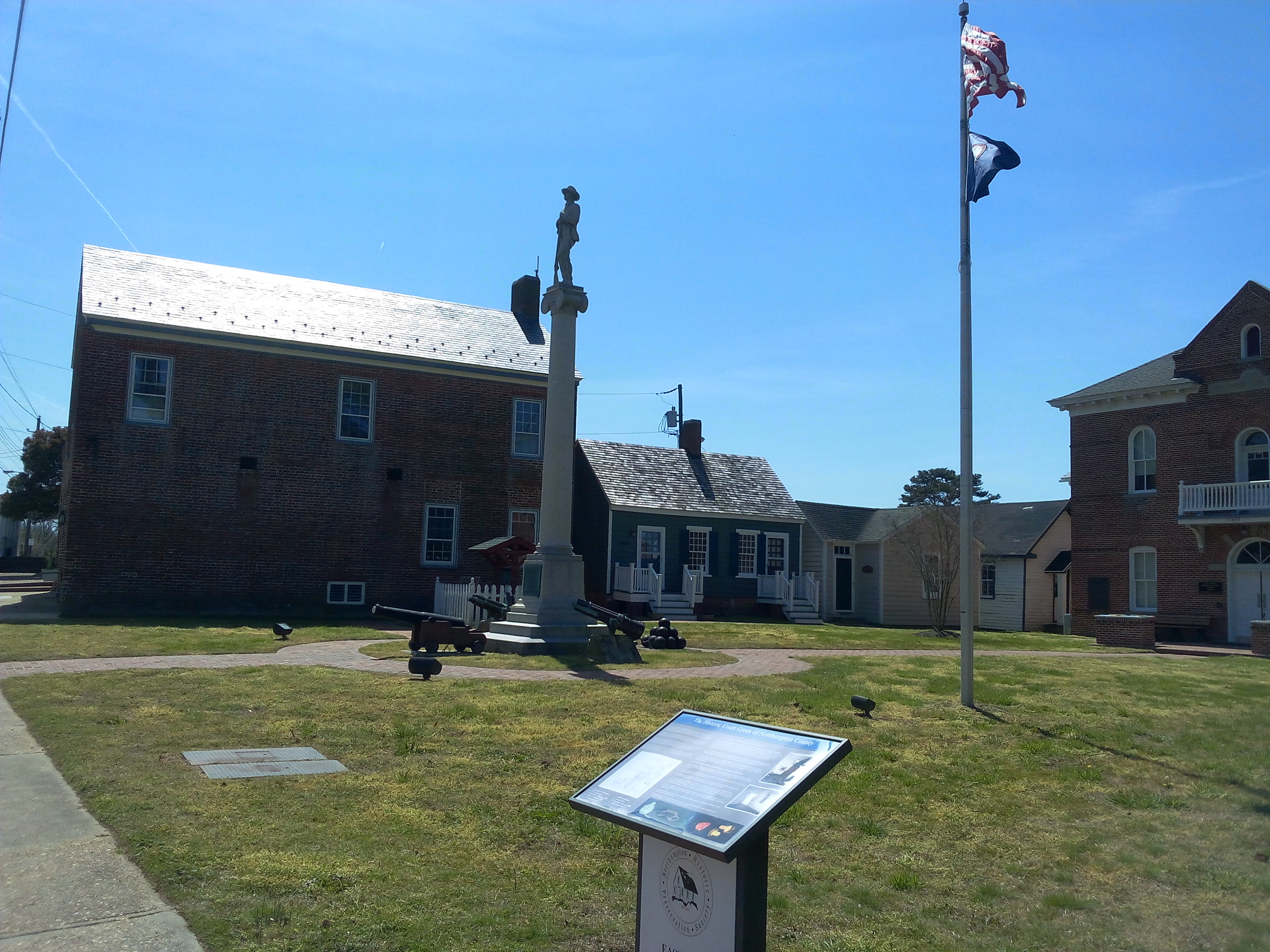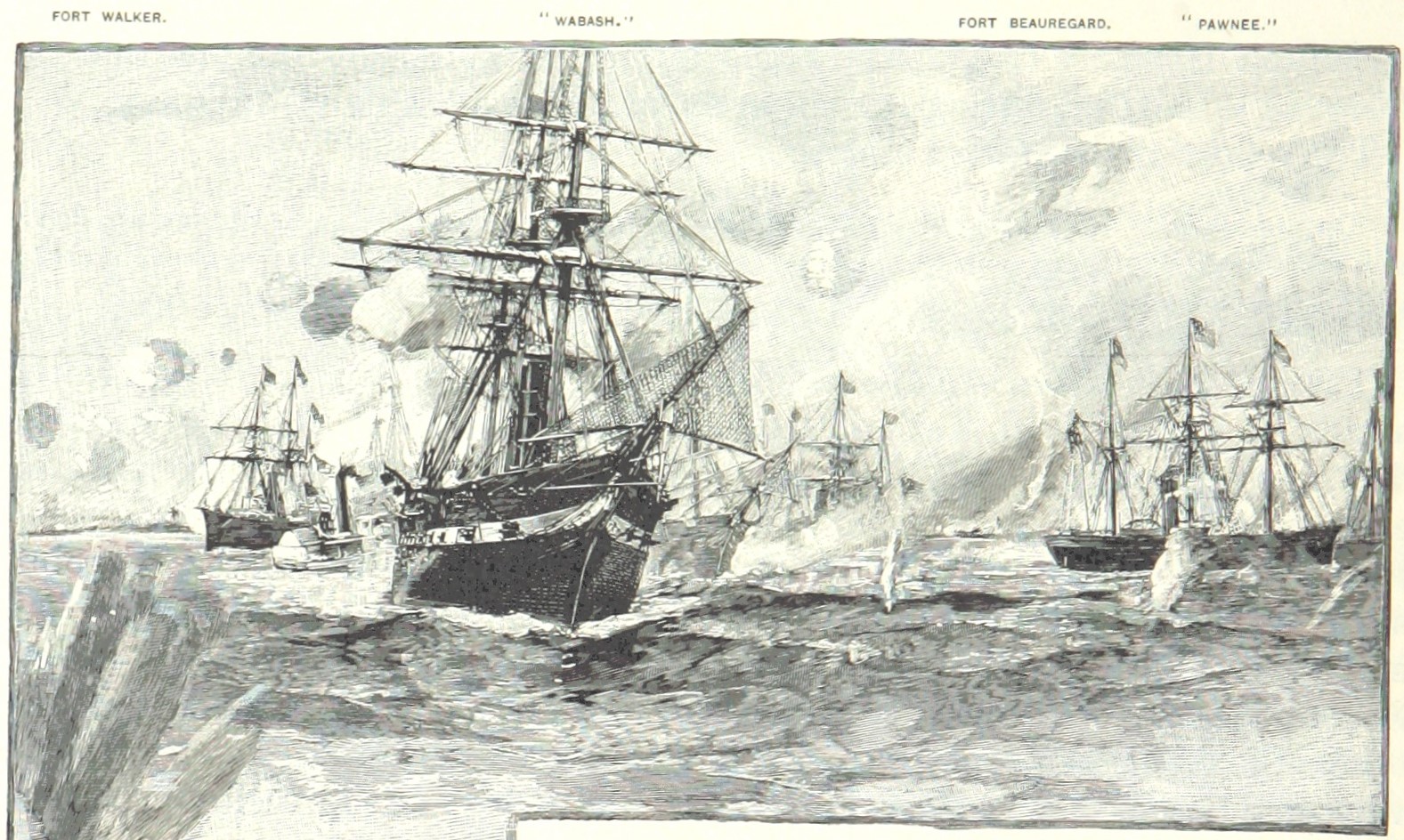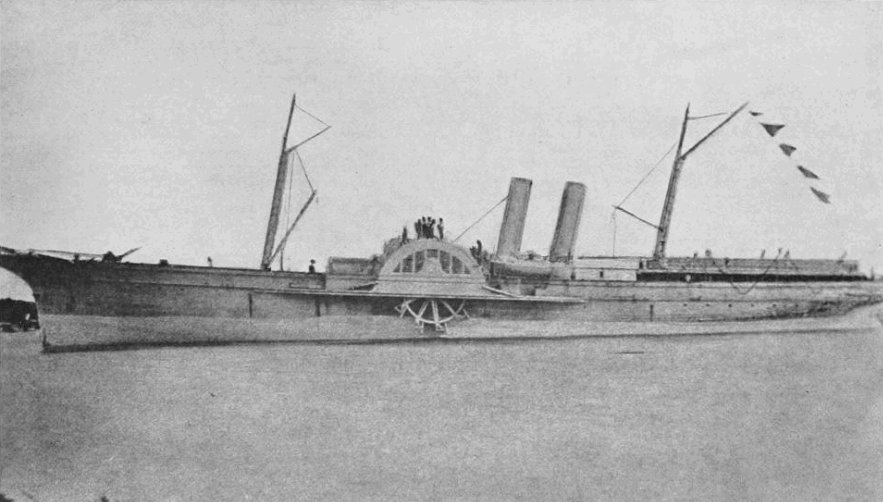|
John Henry Upshur
John Henry Upshur (5 December 1823 – 30 May 1917) was an admiral in the United States Navy who served during the Mexican–American War and the American Civil War. Early life Upshur—born John Henry Nottingham in Northampton County, Virginia December 5, 1823 changed his name at the request of his mother to her maiden name ''Upshur'' gratifying her wish, as the Upshur family was conspicuous in naval annals. He was appointed a midshipman on 4 November 1841 and initially served at sea with the Mediterranean Squadron. During the war with Mexico, Upshur was assigned to ''St. Mary's'' as that brig participated in operations against Tampico. He also served ashore with the naval battery during the attacks against Vera Cruz in March 1847. In the years preceding the Civil War, Upshur carried out assignments in the Mediterranean, the West Indian, and the African Squadrons. He also performed brief tours of duty at the Naval Academy and at the Washington Navy Yard as an ordnance officer. ... [...More Info...] [...Related Items...] OR: [Wikipedia] [Google] [Baidu] |
Northampton County, Virginia
Northampton County is a county located in the Commonwealth of Virginia. As of the 2020 census, the population was 12,282. Its county seat is Eastville. Northampton and Accomack Counties are a part of the larger Eastern Shore of Virginia. The county is the center of the late Eocene meteor strike that resulted in the Chesapeake Bay impact crater. The Northampton County Courthouse Historic District is part of the Eastville Historic District at the county seat. History When English colonists first arrived in the area in the early 1600s, the Virginia Eastern Shore region was governed by Debedeavon (aka "The Laughing King"), who was the paramount chief of the Accomac people, which numbered around 2,000 at the time. The former name of the county was Accomac Shire, one of the original eight shires of Virginia after the founding of the first settlement at Jamestown in 1607. In 2010, the name was changed to Northampton County by the colonists. In 1663, Northampton County was s ... [...More Info...] [...Related Items...] OR: [Wikipedia] [Google] [Baidu] |
African Squadron
The Africa Squadron was a unit of the United States Navy that operated from 1819 to 1861 in the Blockade of Africa to suppress the slave trade along the coast of West Africa. However, the term was often ascribed generally to anti-slavery operations during the period leading up to the American Civil War. The squadron was an outgrowth of the 1819 treaty between the United States and the United Kingdom that was an early step in stopping the trade, and further defined by the Webster–Ashburton Treaty of 1842. Although technically coordinated with a British West Africa Squadron based in Sierra Leone, in practice the American contingent worked on its own. Matthew Perry (naval officer), Matthew Perry was the first commander of the squadron, and based himself in Portuguese Cape Verde. The squadron was generally ineffective, since the ships were too few, and since much of the trading activity had shifted to the Niger River delta area (present-day Nigeria), which was not being cover ... [...More Info...] [...Related Items...] OR: [Wikipedia] [Google] [Baidu] |
Charleston, South Carolina
Charleston is the largest city in the U.S. state of South Carolina, the county seat of Charleston County, and the principal city in the Charleston–North Charleston metropolitan area. The city lies just south of the geographical midpoint of South Carolina's coastline on Charleston Harbor, an inlet of the Atlantic Ocean formed by the confluence of the Ashley, Cooper, and Wando rivers. Charleston had a population of 150,277 at the 2020 census. The 2020 population of the Charleston metropolitan area, comprising Berkeley, Charleston, and Dorchester counties, was 799,636 residents, the third-largest in the state and the 74th-largest metropolitan statistical area in the United States. Charleston was founded in 1670 as Charles Town, honoring King CharlesII, at Albemarle Point on the west bank of the Ashley River (now Charles Towne Landing) but relocated in 1680 to its present site, which became the fifth-largest city in North America within ten years. It remained unincorpor ... [...More Info...] [...Related Items...] OR: [Wikipedia] [Google] [Baidu] |
South Atlantic Blockading Squadron
The Union blockade in the American Civil War was a naval strategy by the United States to prevent the Confederacy from trading. The blockade was proclaimed by President Abraham Lincoln in April 1861, and required the monitoring of of Atlantic and Gulf coastline, including 12 major ports, notably New Orleans and Mobile. Those blockade runners fast enough to evade the Union Navy could carry only a small fraction of the supplies needed. They were operated largely by foreign citizens, making use of neutral ports such as Havana, Nassau and Bermuda. The Union commissioned around 500 ships, which destroyed or captured about 1,500 blockade runners over the course of the war. Proclamation of blockade and legal implications On April 19, 1861, President Lincoln issued a ''Proclamation of Blockade Against Southern Ports'': Whereas an insurrection against the Government of the United States has broken out in the States of South Carolina, Georgia, Alabama, Florida, Mississippi, Louisiana, ... [...More Info...] [...Related Items...] OR: [Wikipedia] [Google] [Baidu] |
Confederate States Of America
The Confederate States of America (CSA), commonly referred to as the Confederate States or the Confederacy was an unrecognized breakaway republic in the Southern United States that existed from February 8, 1861, to May 9, 1865. The Confederacy comprised U.S. states that declared secession and warred against the United States during the American Civil War: South Carolina, Mississippi, Florida, Alabama, Georgia, Louisiana, Texas, Virginia, Arkansas, Tennessee, and North Carolina. Kentucky and Missouri also declared secession and had full representation in the Confederate Congress, though their territory was largely controlled by Union forces. The Confederacy was formed on February 8, 1861, by seven slave states: South Carolina, Mississippi, Florida, Alabama, Georgia, Louisiana, and Texas. All seven were in the Deep South region of the United States, whose economy was heavily dependent upon agriculture—particularly cotton—and a plantation system that relied upon enslaved ... [...More Info...] [...Related Items...] OR: [Wikipedia] [Google] [Baidu] |
Port Royal, South Carolina
Port Royal is a List of cities and towns in South Carolina, town on Port Royal Island in Beaufort County, South Carolina, Beaufort County, South Carolina, United States. The population was 14,220 at the 2020 census. It is part of the Hilton Head Island-Bluffton-Beaufort metropolitan area. Port Royal is home to Marine Corps Recruit Depot Parris Island and United States Naval Hospital Beaufort. History Port Royal takes its name from the adjacent Port Royal Sound, which was explored and named by Frenchman Jean Ribault in 1562. Ribault founded the short-lived settlement of Charlesfort on Parris Island. The area later became the site of a Spanish colonization of the Americas, Spanish and still later Scottish colonization of the Americas, Scottish colony during the 17th century. Port Royal was the site of the Naval Battle of Port Royal during the American Civil War, Civil War. Later during the war, it was the one of the sites of the Port Royal Experiment, which included most of the Sea ... [...More Info...] [...Related Items...] OR: [Wikipedia] [Google] [Baidu] |
USS Wabash (1855)
USS ''Wabash'' was a steam screw frigate of the United States Navy that served during the American Civil War. She was based on the same plans as . Post-war she continued to serve her country in European operations and eventually served as a barracks ship in Boston, Massachusetts, and was sold in 1912. Pre-Civil War service ''Wabash''—the first U.S. Navy ship to bear that name—was laid down on May 16, 1854 by the Philadelphia Navy Yard; launched on October 24, 1855, sponsored by Miss Pennsylvania Grice; and commissioned there on August 18, 1856, Captain Frederick K. Engle in command. ''Wabash'' departed Philadelphia, Pennsylvania on September 7, 1856, stopping at Portsmouth, New Hampshire, to embark President Franklin Pierce for passage to Annapolis, Maryland. She arrived at New York on October 23, 1856, sailing on November 28, 1856 to become flagship of Commodore Hiram Paulding's Home Squadron. The squadron was instrumental in foiling the expedition against Nicaragua under ... [...More Info...] [...Related Items...] OR: [Wikipedia] [Google] [Baidu] |
Sound (geography)
In geography, a sound is a smaller body of water typically connected to a larger sea or ocean. There is little consistency in the use of "sound" in English-language place names. It can refer to an inlet, deeper than a bight and wider than a fjord, or a narrow sea or ocean channel between two bodies of land (similar to a strait), or it can refer to the lagoon located between a barrier island and the mainland. Overview A sound is often formed by the seas flooding a river valley. This produces a long inlet where the sloping valley hillsides descend to sea-level and continue beneath the water to form a sloping sea floor. The Marlborough Sounds in New Zealand are good examples of this type of formation. Sometimes a sound is produced by a glacier carving out a valley on a coast then receding, or the sea invading a glacier valley. The glacier produces a sound that often has steep, near vertical sides that extend deep underwater. The sea floor is often flat and deeper at the ... [...More Info...] [...Related Items...] OR: [Wikipedia] [Google] [Baidu] |
North Carolina
North Carolina () is a state in the Southeastern region of the United States. The state is the 28th largest and 9th-most populous of the United States. It is bordered by Virginia to the north, the Atlantic Ocean to the east, Georgia and South Carolina to the south, and Tennessee to the west. In the 2020 census, the state had a population of 10,439,388. Raleigh is the state's capital and Charlotte is its largest city. The Charlotte metropolitan area, with a population of 2,595,027 in 2020, is the most-populous metropolitan area in North Carolina, the 21st-most populous in the United States, and the largest banking center in the nation after New York City. The Raleigh-Durham-Cary combined statistical area is the second-largest metropolitan area in the state and 32nd-most populous in the United States, with a population of 2,043,867 in 2020, and is home to the largest research park in the United States, Research Triangle Park. The earliest evidence of human occupation i ... [...More Info...] [...Related Items...] OR: [Wikipedia] [Google] [Baidu] |
Hatteras Inlet
Hatteras Inlet is an estuary in North Carolina, located along the Outer Banks, separating Hatteras Island and Ocracoke Island. It connects the Atlantic Ocean to the Pamlico Sound. Hatteras Inlet is located entirely within Hyde County. History The first "Hatteras Inlet" was formed south of the current inlet, but closed around 1764. The modern "Hatteras Inlet" was formed on September 7, 1846 by a violent gale. This massive storm, was the same storm that opened present-day Oregon Inlet. The new inlet at Hatteras became a profitable inlet, because it gave the Inner Banks, NC a quicker and easier route to travel to and from the Gulf Stream. It was easier to come into this inlet from the north than to Ocracoke. Because of the increase in commerce, Hatteras Village Post Office was established in 1858. The initial invasion of the North Carolina coast on Hatteras Island during the Civil War, called the Battle of Hatteras Inlet Batteries, came from Hatteras Inlet on August 28– ... [...More Info...] [...Related Items...] OR: [Wikipedia] [Google] [Baidu] |
North Atlantic Blockading Squadron
The Union blockade in the American Civil War was a naval strategy by the United States to prevent the Confederacy from trading. The blockade was proclaimed by President Abraham Lincoln in April 1861, and required the monitoring of of Atlantic and Gulf coastline, including 12 major ports, notably New Orleans and Mobile. Those blockade runners fast enough to evade the Union Navy could carry only a small fraction of the supplies needed. They were operated largely by foreign citizens, making use of neutral ports such as Havana, Nassau and Bermuda. The Union commissioned around 500 ships, which destroyed or captured about 1,500 blockade runners over the course of the war. Proclamation of blockade and legal implications On April 19, 1861, President Lincoln issued a ''Proclamation of Blockade Against Southern Ports'': Whereas an insurrection against the Government of the United States has broken out in the States of South Carolina, Georgia, Alabama, Florida, Mississippi, Louisiana, ... [...More Info...] [...Related Items...] OR: [Wikipedia] [Google] [Baidu] |
Robert E
The name Robert is an ancient Germanic given name, from Proto-Germanic "fame" and "bright" (''Hrōþiberhtaz''). Compare Old Dutch ''Robrecht'' and Old High German ''Hrodebert'' (a compound of '' Hruod'' ( non, Hróðr) "fame, glory, honour, praise, renown" and ''berht'' "bright, light, shining"). It is the second most frequently used given name of ancient Germanic origin. It is also in use as a surname. Another commonly used form of the name is Rupert. After becoming widely used in Continental Europe it entered England in its Old French form ''Robert'', where an Old English cognate form (''Hrēodbēorht'', ''Hrodberht'', ''Hrēodbēorð'', ''Hrœdbœrð'', ''Hrœdberð'', ''Hrōðberχtŕ'') had existed before the Norman Conquest. The feminine version is Roberta. The Italian, Portuguese, and Spanish form is Roberto. Robert is also a common name in many Germanic languages, including English, German, Dutch, Norwegian, Swedish, Scots, Danish, and Icelandic. It can be use ... [...More Info...] [...Related Items...] OR: [Wikipedia] [Google] [Baidu] |







